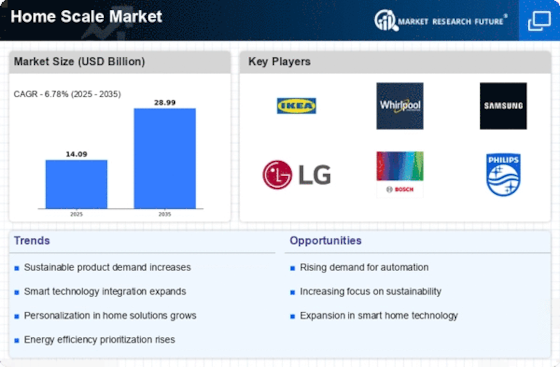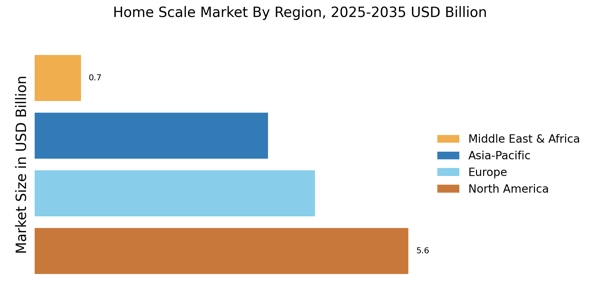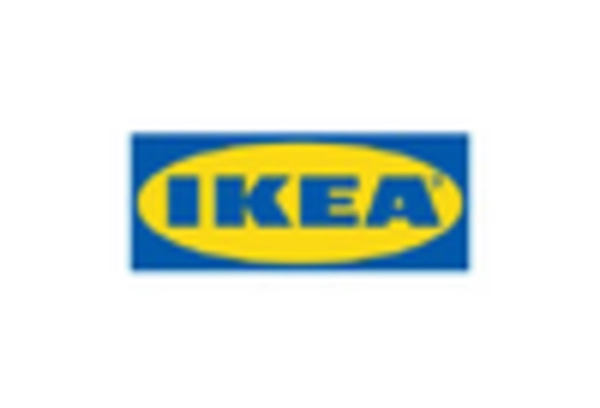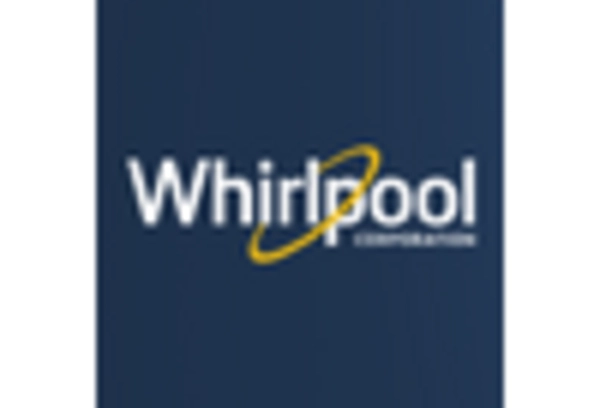Rising Demand for Energy Efficiency
The Home Scale Market is experiencing a notable shift towards energy-efficient solutions. Consumers are increasingly prioritizing sustainability, leading to a surge in demand for products that reduce energy consumption. According to recent data, energy-efficient appliances can reduce energy use by up to 30%, which appeals to environmentally conscious buyers. This trend is further fueled by government incentives aimed at promoting energy efficiency, which encourages homeowners to invest in modern, energy-saving technologies. As a result, manufacturers in the Home Scale Market are innovating to meet this demand, developing products that not only save energy but also enhance overall home comfort. The emphasis on energy efficiency is likely to continue shaping the market landscape, as consumers seek to lower utility bills while contributing to environmental conservation.
Increased Focus on Health and Wellness
The Home Scale Market is witnessing a growing emphasis on health and wellness, which is reshaping consumer preferences and purchasing decisions. As individuals become more health-conscious, there is a rising demand for products that promote well-being within the home environment. This includes air purifiers, water filtration systems, and ergonomic furniture, all of which contribute to a healthier living space. Market data suggests that the wellness market is expanding rapidly, with consumers willing to invest in products that enhance their quality of life. This trend is likely to drive innovation within the Home Scale Market, as manufacturers respond to the demand for health-oriented solutions. The integration of wellness features into home products may become a key differentiator in a competitive market.
Customization and Personalization Trends
Customization and personalization are becoming increasingly prominent in the Home Scale Market, as consumers seek products that reflect their individual tastes and lifestyles. The desire for unique home environments drives demand for customizable options in furniture, decor, and appliances. Market Research Future indicates that consumers are more inclined to purchase products that can be tailored to their specific needs, leading to a rise in brands offering bespoke solutions. This trend not only enhances customer satisfaction but also fosters brand loyalty, as consumers feel a deeper connection to products that resonate with their personal style. As the Home Scale Market evolves, the ability to offer personalized experiences may become a crucial factor for success.
Growing Interest in Sustainable Materials
The Home Scale Market is increasingly influenced by a growing interest in sustainable materials, as consumers become more aware of the environmental impact of their purchasing choices. There is a notable shift towards products made from renewable resources, recycled materials, and eco-friendly manufacturing processes. Data suggests that the market for sustainable home products is expanding, with consumers willing to pay a premium for items that align with their values. This trend is prompting manufacturers to innovate and develop sustainable alternatives across various product categories, from flooring to furniture. As sustainability becomes a key consideration for consumers, the Home Scale Market is likely to adapt, focusing on transparency and ethical sourcing to meet the evolving demands of the market.
Technological Advancements in Home Automation
Technological advancements are significantly influencing the Home Scale Market, particularly through the integration of smart home technologies. The proliferation of Internet of Things (IoT) devices has transformed traditional homes into smart environments, allowing for enhanced control over various home systems. Data indicates that the smart home market is projected to grow substantially, with an expected compound annual growth rate of over 25% in the coming years. This growth is driven by consumer interest in convenience, security, and energy management. As more homeowners adopt smart technologies, the Home Scale Market is likely to see increased demand for interconnected devices that offer seamless integration and user-friendly interfaces. This trend not only enhances the functionality of homes but also aligns with the broader movement towards digital living.

















